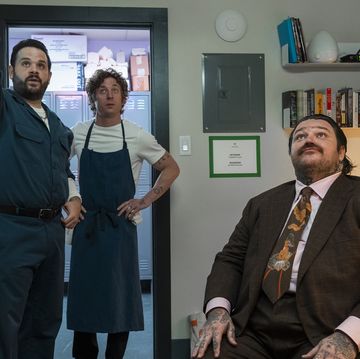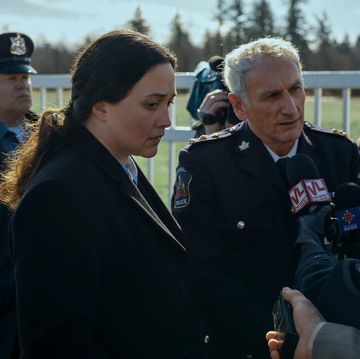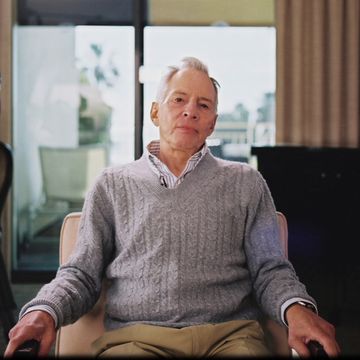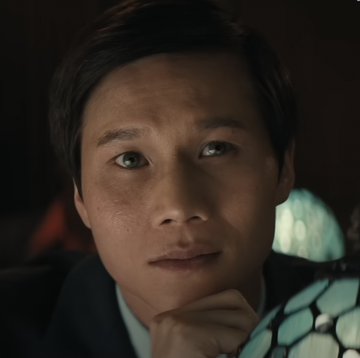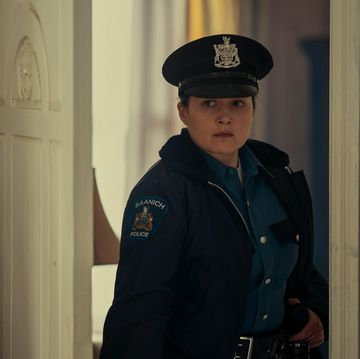It's not exactly accurate to say that Joseph Fiennes plays the villain of The Handmaid's Tale, because no human character earns that label. The villain of this story—both Margaret Atwood's novel and Hulu's lauded adaptation—is misogyny, and the forces that have allowed it to metastasize uncontrollably across the nation, transforming the United States into the puritanical nightmare that is Gilead. But Fiennes' military commander Fred Waterford is the face of the regime, and his slippery cat-and-mouse dynamic with Offred (Elisabeth Moss) is the only arena in which she has any real autonomy. Throughout the season, as she goes from being strictly Waterford's Handmaid to his mistress, it's increasingly unclear who is manipulating whom.
"The men are pretty thinly drawn," Fiennes acknowledges in reference to Atwood's book, "and they have to be, because it's not their story." Though Fred's lack of depth on the page initially left him skeptical about the role, his trepidation didn't last long. "Once I got into the book, and particularly the relationship that grows out of his clandestine meetings with Offred, I thought there was great character copy to be had."
Early on, Waterford seems potentially sympathetic: he treats Offred more kindly than most, almost as though he sees her as a person, and an ominous invitation to his office turns into an endearingly benign game of Scrabble. But by this week's episode, it's become clear that his attention to Offred is selfish, putting her in danger in order to feed his needs rather than hers.
As has been exhaustively noted ever since the show premiered, parallels to Gilead are everywhere in 2017—not only to the regime's oppression of women, but its puritanical brand of nostalgia, and fixation on a return to traditional values. Take the revelation that Vice President Mike Pence cannot dine alone with women who aren't his wife, and then consider Gilead's rule that a commander can only be alone with a handmaid if his wife is also present. Fiennes diplomatically calls the parallels "very, very curious, in this day and age".
Below, Fiennes speaks to Esquire.com about Waterford's "pathetic" brothel dalliance with Offred, his hopes for the now-confirmed second season, and getting into the mind of a rapist.
Though Waterford is inscrutable for much of the show's early episodes, Fiennes worked a lot on unseen backstory.
The thing I wanted to explore was the relationship he had with the previous Offred. Coming to my own conclusions about what her death meant, and the reasons she took her life, and the impact that would have had on the household and Fred, was an interesting starting point. In the book, Fred is described as "a pathetic, soft, withered limb that lives inside a tough military boot." There's a sense of loneliness, and of his wanting to reach out and wanting to care for [Offred], and then there is this lurking monster—a man drunk on his position of power, and all of these arcane rituals he partakes in to keep control.
You should be thrown by him, as Offred is, and that uncertainty makes her knife-edge negotiation of survival that much more gripping. Because in a sense, you want her to find this sanctuary [in his office]. There's life, there's words, there's Scrabble, there's an exchange of human contact, and yet Fred is loving that power exchange, and loving the fact that her life is in his hands. He's ultimately a dark creature, but to begin with I wanted there to be elements that would confuse.
There's a specific reason why Waterford was unable to perform during the ceremony in Episode Four, directly after he asks Offred to join him for Scrabble later and she declines to answer.
Taking away power from a rapist ends up emasculating him to such a degree that he can't perform. I think that's essentially what [that scene] is. Whether it's subliminal or not, he feels that he has lost control when she doesn't answer him. Out of nothing, she manages to find a kind of status in her silence, just not saying, "Yes, I'll meet you for Scrabble at 9:30." Just delaying that response was enough to throw him into turmoil, and physically we see the repercussions of that.
Though Waterford is probably sterile, Gilead doesn't allow for that possibility to be voiced–even to himself.
I think there's probably a two per cent part of his brain that might go there, but he's used to blaming his wife. So much of his disconnect with Serena is based on the barrenness, the idea that she hasn't provided them with a child which is such a status symbol. He's so far down that road of detachment and blame that he wouldn't dream that [the problem] is possibly him. In the higher echelons of Gilead, as a commander, I think it wouldn't befit him too well. The revelation would just be too crushing,and maybe we'll get to see that in the second series. I'd also like season two to really examine how a regime like Gilead comes into effect; the minutiae of that would be fascinating.
Episode Eight reveals the deeply immature impulses that drive Waterford.
He's pushing this relationship to the extreme, and in one sense it's a classic setup, the married man and the mistress. He loves having Offred take on his wife's identity and wear the cloak, and once they cross the bridge into this forbidden territory he's able to operate as he please, transporting them both away from all the rules and regulations. But I think he also loves the power of shocking Offred. There's this "naughty boy" side to him, and I think he gets a kick out of this completely pathetic brothel setup–it's sad in every which way, but I think there's an immature thrill he gets out of the shock factor. He's exhilarated by it.
As tough as the show is to watch, it was even more grueling to shoot.
Every day before filming I had to draw a deep breath, because it's such a creepy world, and such a creepy character to inhabit. A part of me just couldn't wait to get out, and scream, and get back into my hoodie and trainers. The ceremony scenes were deeply disturbing [to shoot], because they're so much about rape culture, although Fred has invented this justification for it through scripture. For me, every utterance and every move he makes is tainted with the corrosive effects of patriarchal authority.
It's ugly, and the fact that it's human nature makes it more ugly. I've met, and read about, and seen, people who just have no sense of equality or humanity. They're privileged to the point of disconnect, and in this world of Gilead, I think Fred believes he's untouchable. Scripture and theocracy have allowed him to disappear behind this cloak of authority, and he's become the mask.








